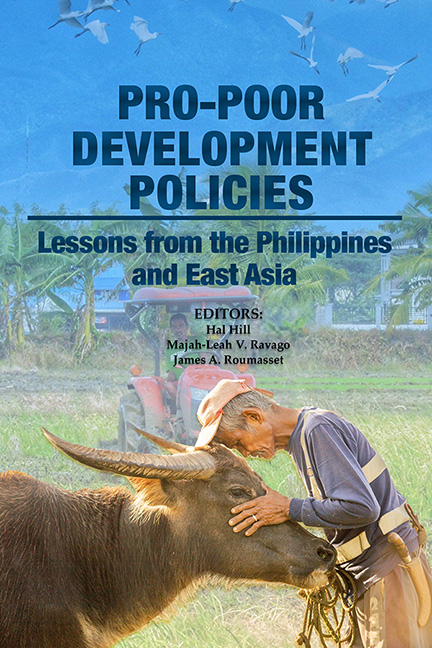Book contents
- Frontmatter
- Dedication
- Contents
- Figures, Tables and Boxes
- Foreword
- Foreword
- Message
- Preface and Acknowledgements
- About the Editors
- About the Contributors
- Acronyms
- Part 1 Introduction and Synthesis
- Part 2 Agricultural and Economic Development
- Part 3 Economic Policies for Achieving Targeted Levels of Living in the Philippines
- Part 4 Inequality and Economic Development
- Part 5 Competition Law and Policy
- Part 6 International Dimensions
- Index
Foreword
Published online by Cambridge University Press: 09 January 2024
- Frontmatter
- Dedication
- Contents
- Figures, Tables and Boxes
- Foreword
- Foreword
- Message
- Preface and Acknowledgements
- About the Editors
- About the Contributors
- Acronyms
- Part 1 Introduction and Synthesis
- Part 2 Agricultural and Economic Development
- Part 3 Economic Policies for Achieving Targeted Levels of Living in the Philippines
- Part 4 Inequality and Economic Development
- Part 5 Competition Law and Policy
- Part 6 International Dimensions
- Index
Summary
A Festschrift is intended to review the origins, depth and breadth of the academic works by a noted scholar in the twilight of their career. From this perspective, writing a foreword to a Festschrift for Arsenio M. Balisacan is a strange task for me. Academically speaking, I think of Arsi as my grandson. His promise as a scholar was noted by Professor Cristina Crisostomo David when he enrolled in the master’s programme in agricultural economics at the University of the Philippines Los Baños in 1979. Tina was my PhD student in the early 1970s at the Food Research Institute at Stanford University, where she documented the striking role of fertilizer and rice prices in the political economy of Asian countries. Arsi continued this work at the University of the Philippines Los Baños under Tina’s direction, and then generalized the results into a conceptual approach to positive political economy in his PhD dissertation at the University of Hawaii, under the mentorship of Professor James A. Roumasset.
My first involvement with agricultural policy in the Philippines came in the early 1970s, when Arsi was still in high school. As part of the Stanford project on “the political economy of rice in Asia” that Tina David worked on, Wally Falcon and I commissioned eight country studies in East and Southeast Asia (including one on the United States by Leon Mears, a familiar name in the Philippines’ food policy circles). I worked closely with Mahar Mangahas on the Philippine study, so became acutely aware by 1975 just how complex the Philippines’ story was. I had drafted the Indonesian country study as a prototype for other country authors and worked closely with all of them right through the publication stage.
This earlier work on the region’s political economy of rice set me up for understanding Arsi’s work. My engagement with his work started with rice policy, but extended more broadly to the fields of agricultural development and the nature of pro-poor economic growth. Both fields are well represented in this Festschrift, via contributions from major authors in the field and through the inclusion of Arsi’s own path-breaking research in both fields.
- Type
- Chapter
- Information
- Pro-poor Development PoliciesLessons from the Philippines and East Asia, pp. xxix - xxxiPublisher: ISEAS–Yusof Ishak InstitutePrint publication year: 2022



